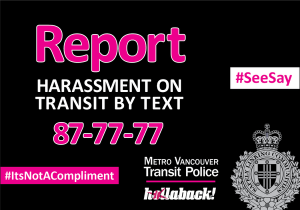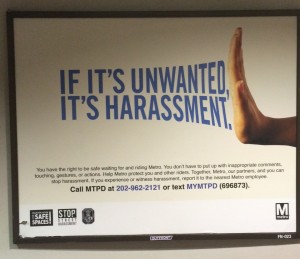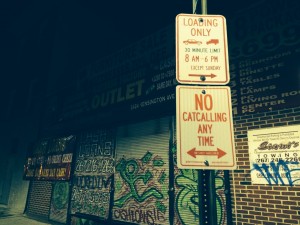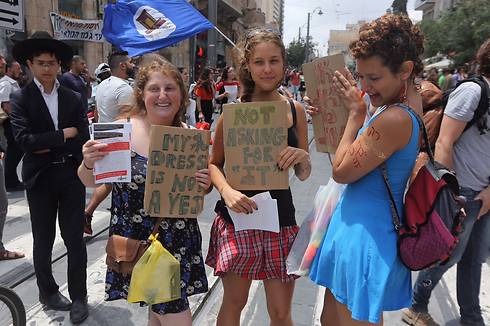For the past several years, I spend hours during the final week of the year going through all of the stories and events that took place related to street harassment. Each year, more and more has happened and that is so extremely positive and encouraging!
Here are snippets and highlights from this year, broken down by topic (e.g. government-led actions, community activism, research, news, and videos) and by country. And it’s divided into two parts (here’s Part 2).
Note that many actions took place during International Anti-Street Harassment Week in April that are not included here. During the week, groups in 41 countries and 24 U.S. states participated.
 I also want to acknowledge one of the biggest events of the year… UN Women hosted a Safe Cities Global Leaders’ Forum in June, and 140 people from 24 countries gathered in Delhi, India, to share ideas about the best strategies to address sexual harassment and other forms of sexual violence in public spaces. Attendees of the conference included government officials, grassroots women, researchers, and staff from UN agencies that are implementing programs that form part of the agency’s Safe Cities Global Initiative (SCGI). Read the wrap-up report.
I also want to acknowledge one of the biggest events of the year… UN Women hosted a Safe Cities Global Leaders’ Forum in June, and 140 people from 24 countries gathered in Delhi, India, to share ideas about the best strategies to address sexual harassment and other forms of sexual violence in public spaces. Attendees of the conference included government officials, grassroots women, researchers, and staff from UN agencies that are implementing programs that form part of the agency’s Safe Cities Global Initiative (SCGI). Read the wrap-up report.
Government-Led Efforts:
Argentina: A bill was proposed to establish fines ranging from AR$100 pesos (approx. US$7) to AR$7,000 ($547), and aims to protect anyone who “self-identifies as a woman” from verbal or physical harassment. Furthermore, the bill proposes a “National Week against Street Harassment” be commemorated yearly from April 12 to 18.
Australia: Fiona Patten, a member of Parliament in Victoria, raised the issue of street harassment in Parliament. Later in the year, legislation introduced by MP Patten to limit protests outside abortion clinics passed.
 Canada: In Vancouver, the transit authority and local Hollaback! chapter launched a campaign to “encourage witnesses on buses and other transit vehicles to make the decision to become active bystanders. As interveners, witnesses can take an active role in sending the message that harassing behaviour is unacceptable and victims are not alone… Victims of harassment can vent through an app, or share their stories online with the hashtag #YouCanEndHarassment.” People also used the hashtag: #ItsNotaCompliment
Canada: In Vancouver, the transit authority and local Hollaback! chapter launched a campaign to “encourage witnesses on buses and other transit vehicles to make the decision to become active bystanders. As interveners, witnesses can take an active role in sending the message that harassing behaviour is unacceptable and victims are not alone… Victims of harassment can vent through an app, or share their stories online with the hashtag #YouCanEndHarassment.” People also used the hashtag: #ItsNotaCompliment
Canada: The Ottawa transit authority launched a new online tool for reporting harassment.
Chile: With the sponsorship of a few politicians, Observatorio Contra el Acoso Callejero Chile presented to Congress the bill called “Law for Street Respect.”
Egypt: Police in Cairo arrested 29 men for sexual harassment during the Eid Al-Fitr holiday.
 France: “Stop – That’s Enough!” is the tagline used by the French government in their awareness campaign, in collaboration with rail operator SNCF and Paris transport chiefs RATP. The campaign includes posters in key places around Paris and flyering events. People can share stories using the hashtag #HarcèlementAgissons, which trended soon after the campaign launched. “The campaign also aims to remind the culprits that sexual harassment is punishable by law and groping can lead to five years in prison”
France: “Stop – That’s Enough!” is the tagline used by the French government in their awareness campaign, in collaboration with rail operator SNCF and Paris transport chiefs RATP. The campaign includes posters in key places around Paris and flyering events. People can share stories using the hashtag #HarcèlementAgissons, which trended soon after the campaign launched. “The campaign also aims to remind the culprits that sexual harassment is punishable by law and groping can lead to five years in prison”
France: In Lille in northern France, the local government released a video showing some of the comments that passengers had been subjected to while out and about in Lille. The video, with English subtitles, includes one woman recount how someone asked her “Hi, can I rape you please?”…
Guyana: Witness Project, a local arts-based group, began tackling street harassment through a campaign that uses visuals and an online forum to capture attention and encourage conversation on the problem.
India: One hundred “SHE Teams” were formed. They entail police personnel in plainclothes mixing with the crowd outside colleges, popular hangouts, cinemas and in public transport to record what happens with hidden cameras. They then take any street harassers to the police station.
India: In the state of Odisha, people can report sexual harassment, violence, and domestic abuse through an ATM.
Nepal: Police gave self-defense lessons to women and girls in camps after a rise in post-earthquake sexual assaults
Panama: Ana Matilde Gómez, an independent member of Panama’s National Assembly introduced a bill that would criminalize street harassment. It would also outlaw bullying, stalking, racism and all forms of sexual harassment. It also calls for developing public policies aimed at preventing these problems.
Peru: The Peruvian government officially passed a law against street harassment, making it one of the few countries to have a national law! Costa Rica and Mexico also have ones.
UK: Jeremy Corbyn, Labour leadership candidate, revealed his platform to end street harassment, and cited SSH and Everyday Sexism in it!
UK: In London, a new campaign called “Report It To Stop It” launched to address sexual harassment and assault on public transit by encouraging passengers to report unwanted behaviors. Created by the Transport for London it includes a video for the campaign.
UK: More than 50 women marched through Liverpool city centre to ‘Reclaim the Night’ and stand up to sexual harassment.
USA: The Los Angeles transit authority launched an anti-harassment campaign called “It’s Off Limits.” It encourages passengers who see or experience sexual harassment to call the sheriff’s hotline at 888-950-7233 or report through the free LA Metro Transit Watch safety app. Later in the year, the Los Angeles Transit Authority released updated plans for addressing sexual harassment on their system.
USA: The DC City Council held the first-ever hearing on street harassment!
 USA: SSH and Collective Action for Safe Spaces worked with the Washington Metropolitan Area Transit Authority (WMATA) on a 2nd wave of anti-harassment ads on the Metro system. Then we did an outreach day at five metro stops and crafted a survey instrument that will be used to survey riders about sexual harassment in 2016
USA: SSH and Collective Action for Safe Spaces worked with the Washington Metropolitan Area Transit Authority (WMATA) on a 2nd wave of anti-harassment ads on the Metro system. Then we did an outreach day at five metro stops and crafted a survey instrument that will be used to survey riders about sexual harassment in 2016
USA: New York lawmakers voted to “establish the crime of improper touching or other sexual contact aboard the subway or other public transportation after an increasing amount of complaints from young women…The misdemeanor also applies to public buses or trains and carries a penalty of up to one year in prison.”
USA: Legislation that would make “upskirt” photographs illegal passed through the New Jersey Assembly’s judiciary committee.
USA: Oregon lawmakers advanced a proposal aimed at closing a loophole in state privacy laws that recently let a man go unpunished after he took photographs up a teenager’s skirt.
New Campaigns and Community-Based Actions:
Global: ActionAid International hosted a #SafeCitiesBecause global day of action on May 20.
Global: The Queer Review is a place where LGBTQ+ people around the world can share their experiences in a variety of places, like restaurants, bars, hair salons, and movie theaters.
Global: Hollaback! expanded their annual Holla:Rev to go global in London.
Global: On April 14, people globally took action to demand the return of the 230 Nigerian school girls who were still missing a year after they were kidnapped from their school. #BringBackOurGirls
Latin America: The Observatory Against Street Harassment campaign that started in Chile grew to include numerous other countries, including Colombia, Bolivia, Nicaragua and Uruguay. They all participated in International Anti-Street Harassment Week in April. In June, people across Argentina, Chile & Uruguay marched in the streets in outrage over violence against women!

Afghanistan: Kubra Khademi, a 25-year-old Afghan artist, wore metal armor as she walked the streets of Kabul for her artistic protest of street harassment called “Armor.” She was harassed so much she had to end the march early and go into hiding due to death threats.
Afghanistan: Men in Afghanistan took a stand for women’s rights.

Argentina: Women rallied under the hashtag #NiUnaMenos and thousands marched in the streets to protest the increase of femicides.
Australia: The LISTEN collective has been working to address harassment at music concerts and festivals.
Australia: The Northern Territory Anti-Discrimination Commission placed advertisements in Darwin city backpacker hostels and job centres after a number of reports of females being propositioned.
Azerbaijan: Men posted photos of themselves wearing mini-skirts to protest against the murder of a Turkish woman who resisted rape.
Brazil: Women shared their “first harassed” stories after sexual comments are directed as a 12-year-old girl. Quickly, the tag #primeiroassedio was used more than 90,000 times.
Brazil: Four young women coders designed an anti-harassment app that lets users review restaurants based on how they treat women.
 Canada and USA: New street signs about street harassment went up in New York City, Philadelphia and Toronto.
Canada and USA: New street signs about street harassment went up in New York City, Philadelphia and Toronto.
Canada: Women in Calgary organized twice to address street harassment. The first time was the campaign #SafeRedMile to advocate for safe public spaces around the Flames hockey stadium. The second was #SafeStampede during the “Greatest Outdoor Show on Earth,” a massive rodeo.
Canada: A reporter called out men who interrupt and harass women reporters while they are on air and that led to many discussions and other articles about this problem.
Costa Rica: Activists marched against street harassment, worked to introduce a new law, and launched a social media campaign targeting men.

Egypt: Imprint Movement launched a campaign comprised of comic strips in subway stations to raise awareness about harassment.
Egypt: HarassMap launched a “Harasser = Criminal” campaign in Egypt.
Egypt: Egyptian women used hashtags like #Idon’tFeelSafeOnTheStreet, #AntiHarassment and #ExposeHarasser on social networking sites to speak up about the daily sexual harassment they experience.
Egypt: “As Safe As Before” is a campaign in Alexandria, Egypt where “volunteers are split up based on gender, with the men dispersed to spot potential cases of harassment, and the women distributing information to girls and families about victims’ rights and encouraging them to report any case of assault to the police.”
Egypt: Uber and HarassMap are collaborating to train drivers how to address inappropriate behavior.
Germany: Teenager Elonë Kastrati started a global trend of posting feminine hygiene products around town, labelled “with different messages pertaining to street harassment, sexual violence and sexism.”
India: Breakthrough launched an anti-street harassment campaign called #AskingForIt.
India: College students launched the “Break the Cage” campaign to protest early curfews for female students, limiting their access to public spaces.
Iran: There were growing efforts to address acid throwing.

Israel: 400 people joined a SlutWalk in Jerusalem, protesting sexual violence, sexual harassment and the objectification of women.
Morocco: Women shared their street harassment stories.
Philippines: The #FreeFromFear social media campaign launched as part of an anti-harassment program.
South Korea: Concerned residents in the Haebangchon neighborhood near Seoul formed a community awareness group People Unite against Street Harassment (PUSH) in response to an increased amount of sexual harassment in the area.
Turkey: A mini bus driver tried to rape Ozgecan Aslan, a student at Cag University in the southern province of Mersin, when she was the last passenger. He beat and killed her, cut off her hands, burned her body and tossed it into a river. News of her grisly death sparked outrage. The following weekend, thousands of people marched in black and online, the hashtag #sendeanlat (#tellyourstory) trended as women shared their stories of harassment and abuse.
UK: Nottingham Women’s Centre organized a summit to explore ways in which attitudes can be altered and behaviour changed to make public places safer for women.
UK: Both the Safe Gigs for Women and Girls Against launched campaigns launched to address sexual harassment, groping and assault against women at music shows.
UK: Rape Crisis UK teamed up with fashion photographer PEROU on new campaign #ThisDoesntMeanYes to dispel the myths around what constitutes consent. They photographed nearly 200 women and officially launched the campaign at www.thisdoesntmeanyes.com on April 15.
USA: Run Philly launched an “Incident Report” page that allows runners to log in incidents of harassment, physical assault, muggings and more that happen while they are running.
USA: A woman in Texas has been working to make street harassment illegal in her city through an online petition and meetings with the Austin city council.
USA: Lyft connects people who need a ride with trained community drivers. Along with CASS and Hollaback!, SSH collaborated with Lyft on creating sexual harassment training videos for their drivers.
USA: Community organizing group Brooklyn Movement Center launched its first “Anti-Street Harassment Bike Patrol” in Bed-Stuy and Crown Heights “aimed at calling out people who hassle women on the street. Once a week, volunteers biked in groups of four to intervene in situations sparked by unsolicited remarks”
USA: Wearing her #whorepants: How one runner turned getting harassed on a run into a movement.
USA: “Pop to Stop” posters provide people with a silent protest/response to harassment.
USA: Teenage girls in Brooklyn created a mural depicting street harassers as zombies!
USA: Teen’s Instagram campaign #WhatMySHSaid sheds light on the horrible things harassers say.
USA: RunHers, Runner’s World, journalist Jen A. Miller and SSH co-hosted a tweet chat on street harassment and running.
 USA: Geeks for CONSent worked with comic conference organizers to address sexual harassment at Comic-Con and Awesome Con.
USA: Geeks for CONSent worked with comic conference organizers to address sexual harassment at Comic-Con and Awesome Con.
USA: CTA Courage Campaign worked hard to get the Chicago Transit Authority to launch an anti-harassment transit campaign.
USA: Conceived by site-specific narratologist and writer Jay Pitter, #mysafetyselfie is a project that is curating selfies + stories from women highlighting spatial and social factors compromising their safety in public spaces.
USA: Shaun Bennet Fauntleroy and Flux Theatre Ensemble produced #SpeakUp: The Street Harassment Plays and it featured five monologues written by playwrights who have been asked to reflect on their feelings as victims of street harassment.
USA: In North Carolina, a college class created a participatory map to document street harassment in their city.
USA: Girl World in Chicago created downloadable and shareable anti-harassment cards.
USA: On International Women’s Day, UN Women hosted a walk from their headquarters to Times Square in New York City. SSH joined the Brazil anti-street harassment group Chega de Fiu Fiu and the American group Voices of Men to send the clear message that street harassment is an issue we must address globally if we want to see equality for women!!

USA: An artist stood for 8 hours in a San Francisco gallery window to raise awareness about street harassment.
Zambia: Women took a stand against street harassment, including by organizing a march.


